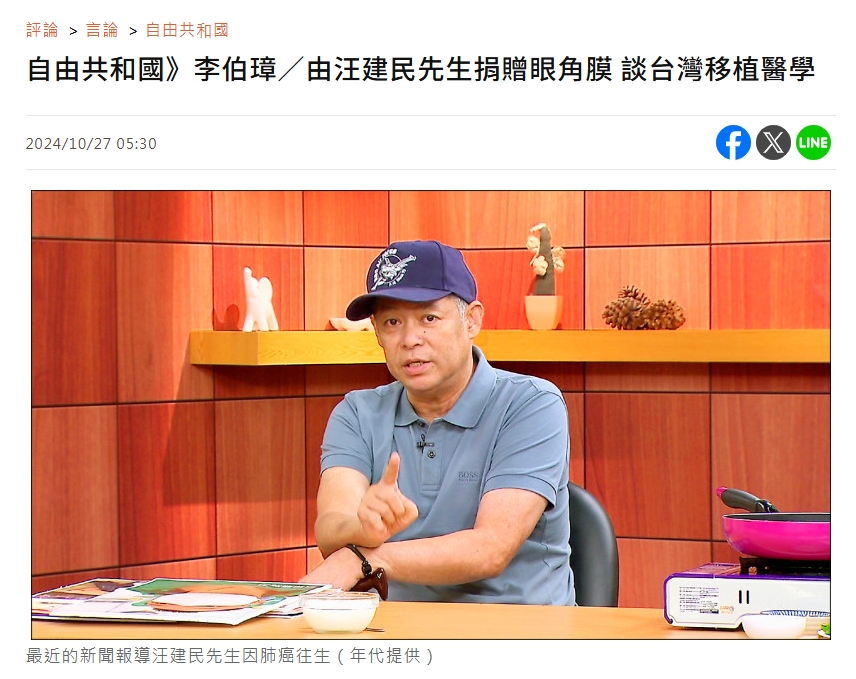【Column Article】Free Republic – “Lee Po-Chang / On Organ Transplantation in Taiwan, Inspired by Mr. Wang Jian-Min’s Corneal Donation”

By: Lee Po-Chang, Chair Professor at the College of Public Health, Taipei Medical University
Published: 2024-10-27
Recent news reported the passing of Mr. Wang Jian-Min due to lung cancer. Due to concerns of potential cancer metastasis, only Mr. Wang’s corneas were eligible for donation. While the media focused on the early diagnosis and best treatments for lung cancer, they showed little interest in the transplant aspect of Mr. Wang’s corneal donation. To the general public, organ donation and transplantation often seem distant concepts.
Why Discuss Organ Transplantation?
For those who wear glasses, not having them can be a hassle, affecting their ability to see clearly. Similarly, Mr. Wang’s corneal donation helped restore sight to a blind individual, changing their fate. Shin Kong Hospital’s transplant team facilitated Mr. Wang’s generous gift to help a visually impaired person regain vision. In theory, when a person dies — typically determined by the cessation of heartbeat or inability to breathe, documented as cardiopulmonary failure on death certificates — if there’s an opportunity to receive a healthy, functioning organ, life can be extended. Chronic patients with heart, liver, lung, or kidney diseases who cannot be cured solely through medication find renewed hope through surgical organ transplantation, an almost miraculous medical technique offering them a “rebirth.”
The Reality in Taiwan
According to the Organ Donation and Transplantation Registry, in 2023, 34 hospitals in Taiwan were equipped to perform kidney transplants. There were 8,764 patients registered on the kidney transplant waiting list, while only 178 received a transplant. For liver transplants, among the 30 qualified hospitals, 957 patients were on the waiting list, with only 106 receiving transplants. Similarly, for heart transplants across 19 hospitals, 342 patients were waiting, but only 51 received transplants. For lung transplants across 12 hospitals, 104 were on the waiting list, and 20 received transplants. Finally, for corneal transplants across 35 hospitals, 1,257 were waiting, with 345 receiving transplants.
The data shows that many patients in need of heart, liver, and lung transplants may pass away before a suitable organ becomes available. Although kidney failure patients can rely on dialysis while waiting, the chance of receiving a donated organ remains slim. For these patients, death should not be an inevitable outcome, and the suffering endured by them and their families is a challenge that the government must pragmatically address.
The Challenges of Organ Donation and Transplantation
Organ donation and transplantation are intensive medical tasks, often performed on weekends or at night, impacting the quality of life of medical professionals involved. I understand the difficulty in cultivating talent in this field. During my tenure at the National Health Insurance Administration, I reported to Minister Chen Shih-Chung about the differences in medical effectiveness and survival rates between long-term dialysis and kidney transplantation. With the aim of enhancing public health, the development of organ transplantation was encouraged, and Minister Chen supported reasonable National Health Insurance payments for transplant surgeries and the responsibilities of coordinators.
In 2023, among the 34 hospitals that could perform kidney transplants, five did not perform any cases, 14 performed one to five cases, five performed six to ten cases, seven performed 11 to 19 cases, and three performed more than 20 cases. Among the 30 hospitals able to perform liver transplants, six had no cases, 17 performed one to five cases, five performed six to ten cases, one performed 11 to 19 cases, and one exceeded 20 cases. Among the 19 hospitals equipped for heart transplants, three had no cases, 11 performed one to five cases, three performed six to ten cases, one performed 11 to 19 cases, and one performed over 20 cases. Among the 12 hospitals able to perform lung transplants, seven did not have any cases, three performed one case, one performed six to ten cases, and one performed 11 to 19 cases.
Promoting Organ Donation Requires Investment
In Taiwan, hospitals and surgeons performing advanced organ transplants must meet certain standards. However, data indicates that many young capable surgeons and hospitals are not highly active in this field. Who is responsible for this? Is it the government’s responsibility, or is there a lack of incentives for doctors?
Patients who rely on organ transplants for a chance at renewed life are truly unfortunate, as purchasing organs in Taiwan is not an option. If the hospital where they are registered cannot actively promote organ donation due to cost considerations, where is the hope for these vulnerable patients? Supporting the development of transplant medicine is a massive social endeavor, not one that hospitals can undertake alone; it requires the government to actively promote organ donation policies.
In addition to regular promotion of organ donation concepts, a practical recommendation would be to place posters about “brain death and organ donation” at ICU entrances and family waiting rooms in hospitals. This gives families an opportunity to understand the significance and value of brain death organ donation in such moments, making the promotion of “great love organ donation upon brain death” more effective. Kidney transplants lead organ donation efforts, so focusing on kidney transplantation can drive the entire organ donation process.
In 2014, Taiwan promoted the concept of “giving” through organ donation to save the lives of strangers. For family members (spouses or blood relatives within three degrees of consanguinity) of these altruistic organ donors, a priority on the waiting list is provided if they ever need a transplant in the future, aligning more closely with the public’s values. These altruistic organ donors leave their descendants not just monetary inheritance but an invaluable health legacy, reflecting the idea of “giving and receiving.” To date, nearly 50 families of altruistic organ donors have benefited from this priority for transplants. Organ donation for the public good is a profound life lesson, not only creating the continuation of another life but also extending love infinitely. Let’s encourage one another in this meaningful endeavor.



